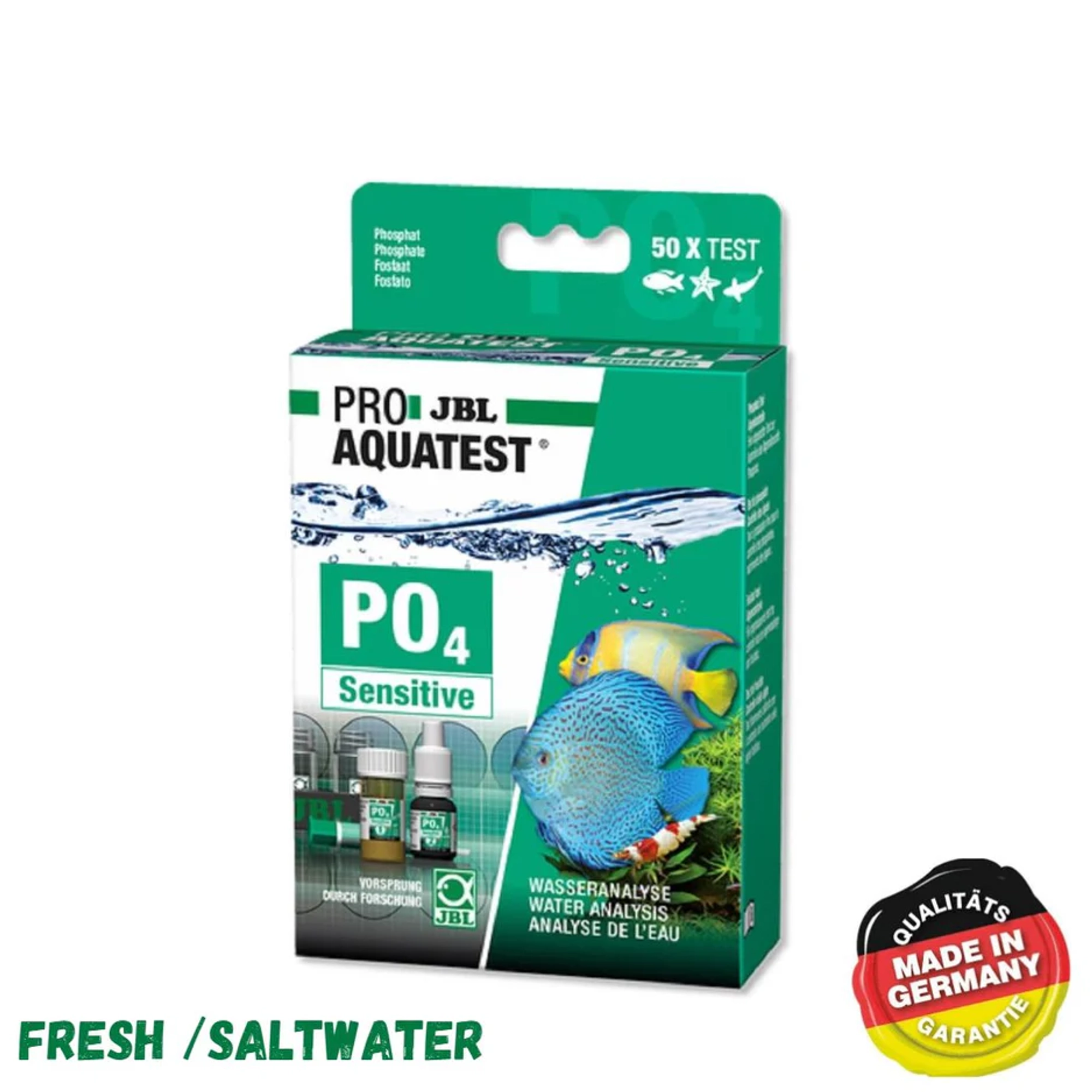

Product Details
SEO-friendly Description:
The JBL ProAqua PO4 Test Kit measures low phosphate levels in aquariums for clear water, preventing algae blooms, and ensuring a healthy, balanced environment.
Detailed Product Description:
The JBL ProAqua PO4 Test Kit is an essential tool for aquarium hobbyists dedicated to maintaining optimal water quality for fish, plants, and corals. Excess phosphate (PO4) levels in aquariums can lead to algae growth, poor water quality, and stress for aquatic life. Designed with precision, the JBL ProAqua PO4 Test Kit enables accurate, reliable phosphate readings to help you control water parameters for a thriving aquarium. Here’s an in-depth look at the importance of phosphate monitoring and how to use this test kit effectively in your aquarium setup.
Why Phosphate Testing is Important
- Algae Control: Elevated phosphate levels promote algae blooms, clouding water and outcompeting plants and corals for essential nutrients. Keeping phosphates low helps prevent unsightly algae growth.
- Water Clarity: Phosphate levels above the natural range cause murky water, impacting visibility and aesthetics in your tank.
- Fish Health: High phosphates can stress fish, lower immunity, and reduce the water quality in your aquarium.
- Plant and Coral Growth: Both plants and corals rely on balanced nutrient levels, including low phosphate, for vibrant growth and stability. Phosphate overload can hinder growth and health.
Key Features of the JBL ProAqua PO4 Test Kit
- High Precision Measurement: The JBL ProAqua PO4 Test Kit detects phosphate levels in ranges from 0.02 to 1.8 mg/L, ideal for low-level phosphate monitoring in both freshwater and saltwater tanks.
- Easy to Use: This kit includes a step-by-step instruction manual, colorimetric chart, and reagents for quick and accurate results. No professional equipment or expertise required.
- Long-lasting Reagents: Each kit provides approximately 50 tests, giving aquarium keepers ample supply for regular water monitoring.
- Ideal for Freshwater and Saltwater: The JBL ProAqua PO4 Test Kit is designed for use in both freshwater and marine environments, providing versatility for multi-tank owners.
Step-by-Step Guide to Using the JBL ProAqua PO4 Test Kit
- Water Sampling: Collect a sample of aquarium water in the test vial provided.
- Reagent Addition: Add the phosphate reagent drops as per instructions and mix gently.
- Wait Time: Allow the reagent to react with the water sample for accurate color development.
- Color Matching: Compare the resulting color with the colorimetric chart to determine the phosphate concentration.
- Interpreting Results: The kit's color chart enables accurate readings to within 0.02 mg/L, allowing for precision adjustments as needed.
Aquarium Conditions with Balanced Phosphate Levels
- Water Parameters: Maintaining phosphates between 0.02–0.05 mg/L is recommended for planted tanks and coral reef setups. Phosphate levels under 1 mg/L are generally safe for fish-only tanks.
- Tank Mates: Keeping phosphates in check benefits all types of tank mates, whether fish, invertebrates, corals, or live plants, by promoting healthier water conditions.
- Feeding Habits: Excess feeding contributes to phosphate buildup, as uneaten food decomposes. Feeding in small amounts and removing uneaten food help control phosphates.
- Routine Maintenance: Regular water changes, gravel vacuuming, and filter maintenance help prevent phosphate accumulation and improve the overall water quality.
Tips for Lowering High Phosphate Levels
- Frequent Water Changes: Regular water changes dilute phosphate concentration in the tank.
- Limit Feeding Amounts: Feed sparingly to reduce food waste, a major phosphate source in aquariums.
- Reduce Stocking Density: More fish produce more waste, which raises phosphate levels. Consider stocking density carefully to prevent nutrient imbalances.
- Phosphate-absorbing Media: Install phosphate-removal media in your filter to absorb excess phosphates.
- Live Plants: Plants naturally absorb phosphates, which can contribute to maintaining lower levels in freshwater tanks.
Additional Care Instructions
- Test Weekly: Phosphate levels can fluctuate quickly, especially in planted or reef tanks, so weekly testing is recommended.
- Observe Livestock Behavior: Fish or corals stressed by high phosphates may show unusual behavior, such as erratic swimming, color fading, or slow growth.
- Compatible with Other Tests: Pair with other JBL test kits (such as NO3 or NH4) for comprehensive water parameter monitoring, as nitrates and ammonia can also impact phosphate levels indirectly.
The JBL ProAqua PO4 Test Kit is your reliable partner in maintaining a balanced, algae-free aquarium. With its precise measurements and easy-to-use design, this test kit empowers hobbyists to keep phosphate levels under control, fostering a healthy and visually stunning aquatic environment.
JBL ProAqua PO4 test kit (Measure Low Phopshate Level)
Product Options
JBL ProAqua PO4 test kit (Measure Low Phopshate Level)
Delivery
Quantity
 East Ocean Aquatic Havelock
East Ocean Aquatic Havelock Aquarium Fishes, Tanks & Supplies From East Ocean Aquatic Havelock


 SG
SG


